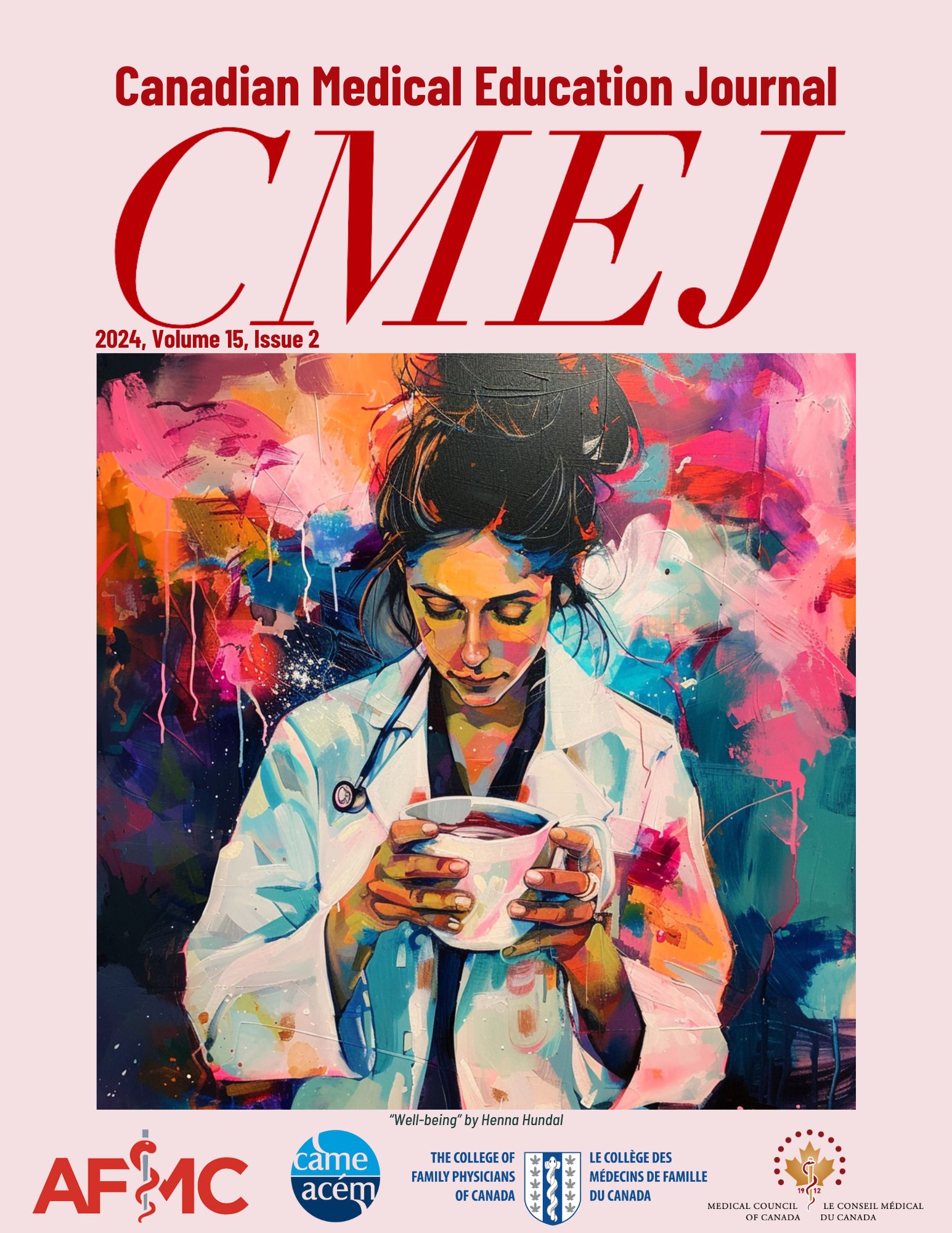Understanding the perspective of community co-educators on community-based service learning: a qualitative analysis
DOI:
https://doi.org/10.36834/cmej.76453Abstract
Background: Community-based service learning (CBSL) is a core component of the Canadian medical education system. However, the unique role of community partner organizations (CPOs) in supporting CBSL remains unclear. This qualitative study evaluates the perspective of CPOs as co-educators in the undergraduate medical curriculum.
Methods: We conducted eight semi-structured, one-on-one interviews with CPOs at a medical school in Toronto, Ontario between 2020-2021. Interviews were conducted following a pre-determined interview guide and then recorded, de-identified, and transcribed. Three reviewers independently performed an inductive thematic analysis of codes followed by a group review of discrepancies.
Results: Five main findings were identified: 1) CPOs share a common interest in serving as co-educators; 2) considerable heterogeneity in the understanding of co-education exists; 3) there is an opportunity for increased partnerships between CPOs and faculty; 4) the role of co-educators is limited by curriculum structure; and 5) co-educators facilitate unique teachings of social determinants of health otherwise not available through traditional didactic teaching.
Conclusions: There is an emerging, unique role for community co-educators in the undergraduate medical curriculum, supported by interest from CPOs. Its emphasis may contribute to future cohorts of medical students capable of understanding and addressing the needs of the populations they serve.
References
Hays R. Community-oriented medical education. Teaching Teacher Educ. 2007;23(3):286-93. https://doi.org/10.1016/j.tate.2006.12.018. DOI: https://doi.org/10.1016/j.tate.2006.12.018
Doobay-Persaud A, Adler MD, Bartell TR, et al. Teaching the social determinants of health in undergraduate medical education: a scoping review. J Gen Intern Med. 2019;34:720-30. https://doi.org/10.1007/s11606-019-04876-0. DOI: https://doi.org/10.1007/s11606-019-04876-0
Strasser R, Worley P, Cristobal F, et al. Putting communities in the driver’s seat: the realities of community-engaged medical education. Acad Med. 2015;90(11):1466-70. https://doi.org/10.1097/ACM.0000000000000765. DOI: https://doi.org/10.1097/ACM.0000000000000765
Mennin S, Petroni‐Mennin R. Community‐based medical education. Clin Teach. 2006;3(2):90-6. https://doi.org/10.1111/j.1743-498X.2006.00093.x. DOI: https://doi.org/10.1111/j.1743-498X.2006.00093.x
Hunt JB, Bonham C, Jones L. Understanding the goals of service learning and community-based medical education: a systematic review. Acad Med. 2011;86(2):246-51. https://doi.org/10.1097/ACM.0b013e3182046481. DOI: https://doi.org/10.1097/ACM.0b013e3182046481
Irby DM, Wilkerson L. Educational innovations in academic medicine and environmental trends. J Gen Intern Med. 2003;18(5):370-6. https://doi.org/10.1046/j.1525-1497.2003.21049.x. DOI: https://doi.org/10.1046/j.1525-1497.2003.21049.x
Quinn SC, Gamble D, Denham A. Ethics and community-based education: Balancing respect for the community with professional preparation. Fam Commun Health. 2001:9-23. http://www.jstor.org/stable/44953949. DOI: https://doi.org/10.1097/00003727-200101000-00004
Stearns JA, Stearns MA, Glasser M, Londo RA. Illinois RMED: a comprehensive program to improve the supply of rural family physicians. Fam Med. 2000;32(1):17-21. PMID: 10645509.
Sakai DH, Fukuda MH, Nip IL, Kasuya RT. School health education at the Queen Emma Clinics: a service-learning project at the John A. Burns School of Medicine. Hawaii Med J. 2002;61(1). PMID: 11868198
Kaufman A, Galbraith P, Alfero C, et al. Fostering the health of communities: a unifying mission for the University of New Mexico Health Sciences Center. Acad Med. 1996;71(5):432-40. http://doi.org/10.1097/00001888-199605000-00010. DOI: https://doi.org/10.1097/00001888-199605000-00010
Averill NJ, Sallee JM, Robinson JT, et al. A first-year community-based service learning elective: design, implementation, and reflection. Teach Learn Med. 2007;19(1):47-54. http://doi.org/10.1080/10401330709336623. DOI: https://doi.org/10.1080/10401330709336623
Ferrari JR, Worral L. Assessments by community agencies: how "the other side" sees service-learning. Michigan J Commun Serv Learn. 2000;7(1):35-40.
Blouin DD, Perry EM. Whom does service learning really serve? Community-based organizations' perspectives on service learning. Teach Sociol. 2009;37(2):120-135. https://doi.org/10.1177/0092055X0903700201. DOI: https://doi.org/10.1177/0092055X0903700201
Hammersley L. Community-based service-learning: partnerships of reciprocal exchange? APJCE. 2012;14(3):171-184.
Cresswell JW. Qualitative inquiry and research design: choosing among five traditions. In: Thousand Oaks, CA: Sage; 1998.
JM. Designing qualitative research. In: Denzin NK, Lincoln YS, editors. Handbook of qualitative inquiry. Thousand Oaks, CA: Sage; 1994.
Walker A, Mercer J, Freeman L. The doors of opportunity: How do community partners experience working as co-educators in a service-learning collaboration? J University Teach Learn Pract. 2021;18(7):56-70. https://doi.org/10.53761/1.18.7.5
Miron D, Moely BE. Community agency voice and benefit in service-learning Michigan J Commun Serv Learn. 2006;12(2):27-37.
Stewart T, Alrutz M. Meaningful relationships: Cruxes of university-community partnerships for sustainable and happy engagement. J Com Engage Schol. 2012;5(1):44-55. http://doi.org/10.54656/NYHZ8317. DOI: https://doi.org/10.54656/NYHZ8317
Stewart T, Wubbena Z. An overview of infusing service-learning in medical education. Internat J Med Educ. 2014;5:147. http://doi.org/10.5116/ijme.53ae.c907. DOI: https://doi.org/10.5116/ijme.53ae.c907
Berrington R, Condo N, Rubayita F, Cook K, Jalloh C. Community organization feedback about an undergraduate medical education service learning program. Can Med Ed J. 2021;12(4):70-8. https://doi.org/10.36834/cmej.71420. DOI: https://doi.org/10.36834/cmej.71420
Downloads
Published
Issue
Section
License
Copyright (c) 2023 Grace Zhou, Aarabi Thayaparan, Stephanie Park, Yasamin Sadeghi, Brandi Deimling, Roxanne Wright, Fok-Han Leung

This work is licensed under a Creative Commons Attribution-NonCommercial-NoDerivatives 4.0 International License.
Submission of an original manuscript to the Canadian Medical Education Journal will be taken to mean that it represents original work not previously published, that it is not being considered elsewhere for publication. If accepted for publication, it will be published online and it will not be published elsewhere in the same form, for commercial purposes, in any language, without the consent of the publisher.
Authors who publish in the Canadian Medical Education Journal agree to release their articles under the Creative Commons Attribution-Noncommercial-No Derivative Works 4.0 Canada Licence. This licence allows anyone to copy and distribute the article for non-commercial purposes provided that appropriate attribution is given. For details of the rights an author grants users of their work, please see the licence summary and the full licence.











